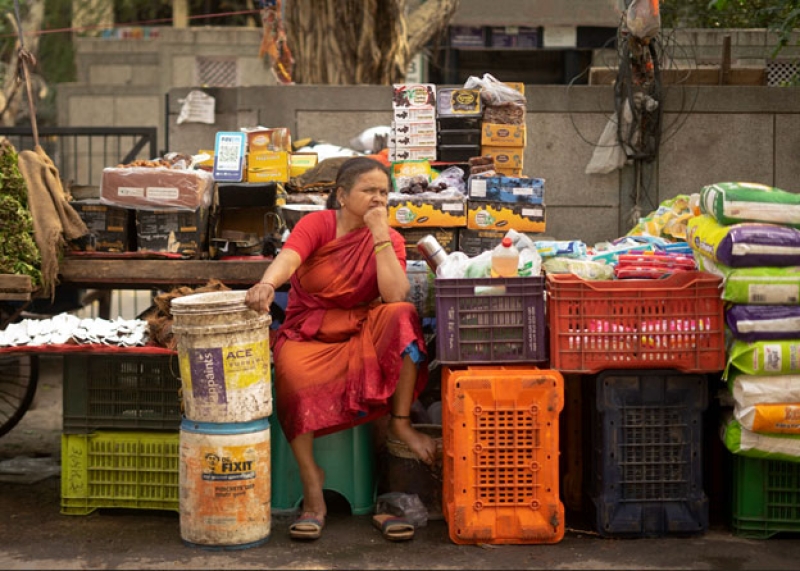- Israel Strikes Tehran with US Support Amid Nuclear Tensions |
- India Sees 9% Drop in Foreign Tourists as Bangladesh Visits Plunge |
- Dhaka Urges Restraint in Pakistan-Afghan War |
- Guterres Urges Action on Safe Migration Pact |
- OpenAI Raises $110B in Amazon-Led Funding |
Relentless Heat Hit South Asian Cities Amid Climate Injustice

Street vendor exposed to extreme heat, New Delhi, 2024. Credit: Greenpeace India
From the scorching pavements of Delhi to the humid alleyways of Colombo, informal workers across South Asia are enduring the growing toll of extreme weather on their bodies, livelihoods, and dignity.
In 2024, cities like Delhi and Dhaka experienced unrelenting, record-breaking heatwaves. In Nepal, the heaviest rainfall in decades triggered deadly floods and landslides, while Sri Lanka faced repeated violent storms that displaced hundreds of thousands. These climate disasters underscore the region’s acute vulnerability.
Yet, the voices of those hit hardest are still excluded from the rooms where climate decisions are made.
On Labour Day, Swastika, President of the United Federation of Labour Sri Lanka, highlighted the devastating effects of heat on daily wage earners and asked the pressing question: “When will polluters be held accountable?”
South Asia is home to one in four people on Earth, yet it is responsible for just 8% of cumulative global CO2 emissions—while suffering some of the worst consequences of climate collapse.
According to the World Bank, over the past two decades, more than 750 million people in South Asia—over half the population—have been affected by climate-related disasters.
These impacts are no longer distant warnings. India alone may lose 34 million full-time jobs by 2030 due to heat stress. Bangladesh already loses $6 billion annually in labour productivity. In Nepal, where over 70% of workers are in agriculture, unpredictable rains and flash floods are forcing labour migration and slashing crop yields.
By 2050, climate change could displace between 100 and 200 million people in the region, creating a surge in climate refugees. Yet these losses are often reduced to statistics—rarely seen as human suffering, and almost never compensated.
This disconnect lies at the heart of global climate injustice.
For workers in the Global South, climate change is not abstract—it’s failed harvests, toxic air, unbearable heat, and unsafe working conditions. Yet climate policies are drafted by ministries and consultants disconnected from this daily reality.
Labour ministries, unions, and welfare boards are largely absent from national climate planning. Heat Action Plans rarely include worker-centric measures such as paid rest breaks, cooling stations, or medical support for outdoor workers.
This isn’t a policy gap—it’s a governance failure.
By ignoring labour protections, current climate plans risk worsening existing inequalities. Outdoor workers, gig workers, migrant labourers, and women in informal employment must be treated not as vulnerable beneficiaries, but as central actors in climate resilience.
For over a century, corporations profited from exploiting the planet, while offloading the human cost onto its most marginalised workers. Now, those same workers are demanding justice.
The Polluters Pay Pact—an international campaign backed by unions, climate groups, and frontline communities—is pushing for fossil fuel giants to fund compensation for those enduring the fallout of climate destruction.
In 2024 alone, five oil and gas companies earned over $100 billion in profits. Meanwhile, informal workers in South Asia suffer without compensation, insurance, or basic protections.
This is not about aid—it’s about owed justice.
The pact calls for binding commitments: climate-linked funding, worker-led adaptation, and global recognition of labour as central to climate action. And it is already gaining traction. Across South Asia, grassroots campaigns are taking legal action, demanding compensation, and pushing for fossil fuel taxes to support worker protections.
This marks a new phase of climate accountability—led by workers, grounded in justice, and fuelled by the belief that those who suffer should not bear the cost alone.
Here’s what “labour justice is climate justice” means in practice:
Classify Climate Risks as Workplace Hazards: National labour laws should recognise extreme weather as an occupational risk, entitling workers to paid breaks, medical support, and compensation.
Invest in Worker-Centred Infrastructure: Governments must build localised protections—cooling stations, early warning systems, and healthcare facilities—funded by taxes on fossil fuel profits.
Embed Worker Voices in Climate Governance: Worker unions must be formally included in climate policy and adaptation planning. Plans made without them are doomed to fail.
It’s time to shift from damage to repair, from exploitation to protection. Real climate action requires placing frontline workers at its core.
Polluters must pay—not just for emissions, but for the resilience and rights of the people who hold up our economies.
Sri Lanka has taken this message to the International Court of Justice, framing climate inaction by major emitters as a violation of human rights. It’s a powerful step, and one that other South Asian nations are joining.
The fight for climate justice is gaining momentum—and workers are leading the way.

